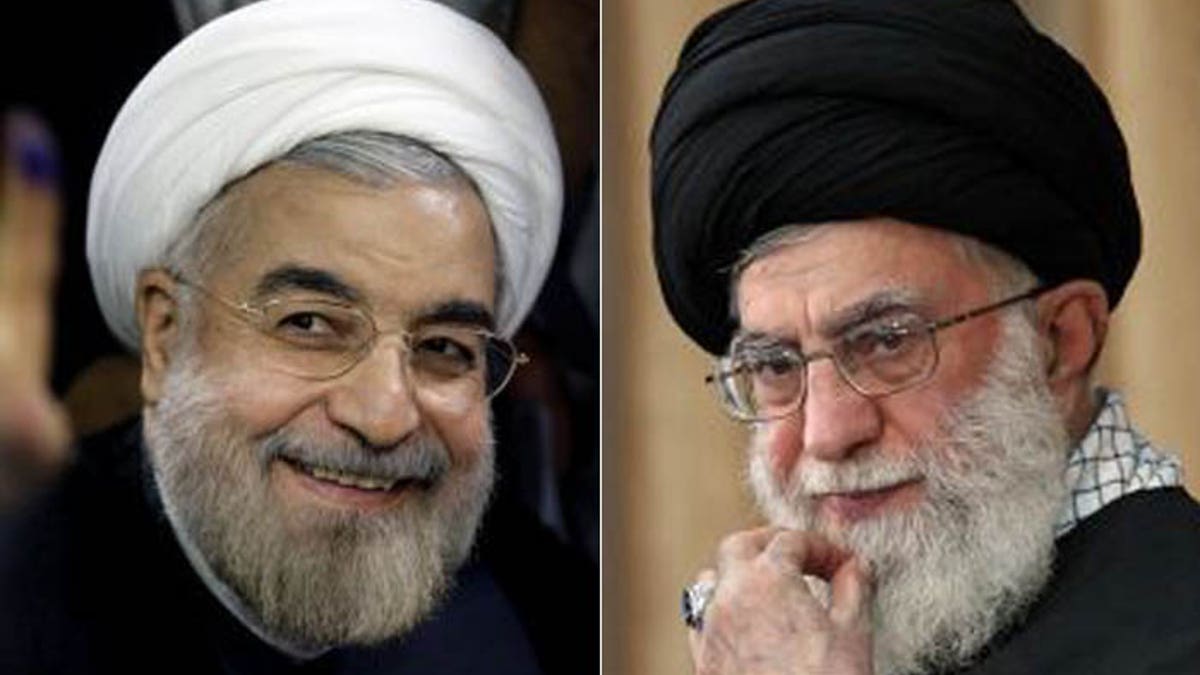
Iran's so-called "moderate" president-elect, Hasan Rowhani, (l.) still must answer to Supreme Leader Ali Khamenei, (r.). (AP)
The winner in Iran's presidential election has been labeled a "moderate," but his record of working closely with the nation's religious leaders - particularly on thwarting international weapons inspections - leaves scant hope for a thaw in the Islamic Republic's relations with the West, according to experts.
Hasan Rowhani won 50.7 percent of the 37 million votes counted in Friday’s election, according to the Interior Ministry, prompting Iranians to celebrate in the streets and some international observers to see reason for hope the nation might temper its defiant diplomatic stance toward the U.S. and Europe. Rowhani, the only cleric in the six-man field, is considered moderate relative to his hard-line rivals, all hand-picked by the country’s Guardian Council, a panel of hawkish clerics entrusted to maintain the values of the Islamic Republic.
[pullquote]
But a closer look at Rowhani's resume reveals a history of advancing the agenda of Iranian Supreme Leader Ali Khamenei. As secretary to the National Security Council for 16 years and top nuclear negotiator from 2003 to 2005, Rowhani was the face of Iran's diplomatic duplicity, often publicly pledging cooperation with nuclear inspectors even as the nation continued its intransigence.
“What we will see from Rowhani, I think, are conciliatory statements in public, while in secret, going forward with the nuclear program,” said Mark Wallace, chief executive officer of United Against Nuclear Iran (UANI). “And in many cases it’s worse than what we’ve had. It’s dishonest.”
More about Rowhani's past may not be what meets the eye. According to his autobiography, he studied judicial law as an undergraduate at the University of Tehran, then traveled west to pursue advanced degrees including a masters in philosophy and a doctorate in law from the University of Glasgow. But after looking into Rowhani's educational background, the U.K. newspaper the Telegraph last week reported that his credentials were "under scrutiny." The dates of his studies do not match up to the rest of his resume, and they found no record of anyone with that name, according to their investigations.
Rowhani, 64, has talked about restoring diplomatic ties with the U.S., which have been halted since the 1979 hostage crisis when the U.S. Embassy was seized by hard-liners. But even taken at his word, Rowhani faces the fact that Iran’s presidents have little social or political leverage. Absolute power remains in the hands of Iran’s supreme leader.
And it may be unwise to take Rowhani at his word when he speaks for Western consumption, according to Wallace, who suggests looking “at the past to gauge the future.”
While campaigning, Rowhani proudly spoke about his service as Iran’s nuclear negotiator, admitting that Iran secretly advanced its nuclear weapons capability and deceived the international community to avoid harsh sanctions.
He promised more of the same during his presidency.
Rowhani’s victory comes at a critical time in international diplomacy over Iran’s nuclear program and deep involvement in Syria.
Now Syria wants to “expand its relations” with Rowhani’s regime, Prime Minister Wael al-Halqi said Sunday.
Tehran has been providing different levels of support to Bashar Assad’s regime in Syria, which has been brutally fighting the opposition since March 2011.
The Syrian National Coalition, a central faction of the opposition, sent a formal statement to newly elected President Rowhani, urging him to reconsider Iran’s support for the Assad regime.
The Syrian opposition has accused Iran of providing weapons and technology, while dispatching fighters through Lebanon’s Hezbollah and other volunteers.
Iran, meanwhile, reportedly is preparing to send 4,000 Revolutionary Guard soldiers to Syria, according to a recent report released by the Independent.
Iran also is planning to open up a new front of the Syrian conflict in the Golan Heights area within close proximity to Israel, according to the Independent.
Israeli Prime Minister Benjamin Netanyahu on Sunday urged the international community to continue pressuring Iran in order to curb its nuclear program under a Rowhani presidency.
“The international community must not give in to wishful thinking or temptation and loosen the pressure on Iran for it to stop its nuclear program,” Netanyahu said to members of his Cabinet.
Iran has been politically and economically isolated and further debilitated by several rounds of sanctions imposed by the West for the regime’s rogue policies and ongoing nuclear agenda. A regime change could prompt an unwarranted change in that dynamic.
"Rowhani's win is indeed a victory, but whose victory?" said Soli Shahvar, director at the Ezri Center for Iran & Persian Gulf Studies at Israel's University of Haifa. "I believe that it's the regime's victory if we happen to see a softening of the U.S. and western pressure on Iran."
